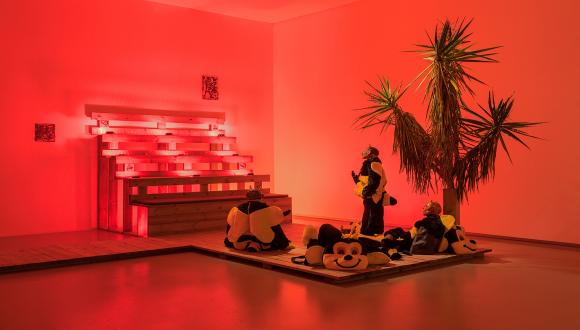Noy and Tamir
Noy & Tamir
Tomato | Tomahto, 2023
Noy and Tamir’s project Tomato | Tomahto came about through the dialogue with Prof. Yair Bar-Haim, who studies attention bias modification as a tool for treating and preventing anxiety disorder and combat-related PTSD. In Bar-Haim’s lab, alertness and attention to threats become a therapeutic tool. Pairs of words, one neutral and the other threatening (e.g., tomatoes–victims), or visual stimuli like faces or photos, are used for cognitive training. The objective of this training is to improve threatening data processing and to form psychological defense that will help soldiers better cope with possible traumatic situations.
Drawing on Prof. Bar-Haim’s research-therapeutic methods, Noy and Tamir create a traumatic world rooted in their own experience with anxiety and trauma, triggered by mechanisms of power and control. The entrance through a monumental “Trigger Warning” gate sets the viewers as active participants in a supposedly scientific setting. A series of rules and regulations, detailing proper conduct in the space beyond the gate, fosters a state of constant alertness in this mysterious world, both alluring and intimidating. The non-human — whether it is the written word or images of a bee or a tomato — is imbued with threatening vitality. Ceramic sculptures of archetypal shapes seem to emerge from an ancient world, while bee costumes taken from the world of children׳s entertainment are turned into soldiers׳ uniforms. Together, these create a performative event that intertwines dark humor with the horror of a psychological thriller, allowing a critical examination of the different ways visual attention is affected by warnings, threats, and anxiety.
In Tomato | Tomahto, Noy and Tamir use familiar structures based on the language of war — resting soldiers, assault weapons, marching anthems — to unfold a fictional and fantastical world. They ask how we as a society internalize cognitive conditioning and learn to accept violent presence as a given, while constantly, naturally, and even unwittingly, learning to repress and deny it. The different stimuli compete for our attention, resonating the violent struggle for control of the sociopolitical narrative in contemporary Israel — a society where an enduring state of war and emergency has been fully normalized.


